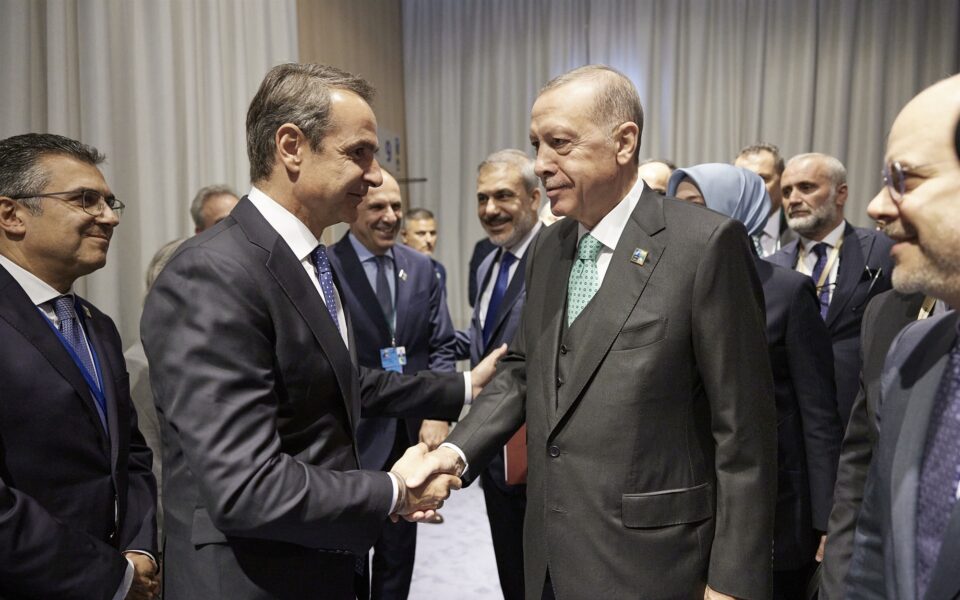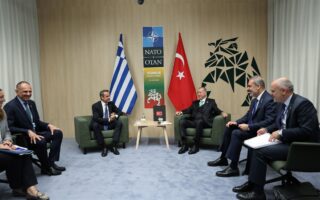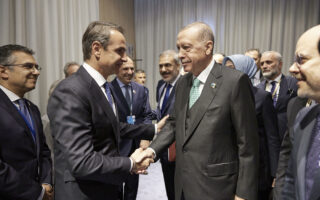Why the International Court is our best option

Greek-Turkish relations have been through all sorts of phases since 1974, but they mainly tend to be trapped in a vicious cycle of negativity and misconceptions, while the middling prospects of a resolution strengthen the belief that dialogue is futile and that a win for one side automatically means a loss for the other. In short, it is a zero-sum game.
Given this approach, it makes sense to wonder whether there is any scope for finding a sustainable solution. The fact is that the leadership on both sides needs to show the requisite political courage, as part of the political elite, as well as of the public opinion shapers, regularly playing the nationalist card to forward their own agendas. Mindful of the political cost, though, the leaderships are afraid to speak openly. All they accomplish by so doing, however, is to cultivate utopian expectations, which they know are unattainable, in the public’s mind.
Turkey is definitely the star in this, but there are circles in Greece too that have a stake in the inertia created by the belief that Ankara’s outrageous demands prevent any initiative whatsoever from being taken. So, they exploit the fact that every proposal for a way forward appears absurd – a belief that is strengthened by Ankara’s aggressive posturing with threats like “We will come in the night,” or claims that “the Greeks become panic-stricken when we talk about the Typhoon missile” – and demand specific terms for agreeing to the resumption of dialogue, terms which they know will not be accepted. The result of all this is that we are put us right back in the same negative territory where we started.
At the same time, anyone who proposes a different approach is accused of appeasement, because dialogue with a country that constantly adds new items to its list of claims is regarded as taboo, since it can, apparently, only lead to concessions or the legitimization of the other side’s position. This school of thought holds that the constant strengthening of our country’s defenses is enough to prevent Turkey from creating dangerous precedents. Ankara is indeed mindful of Greece’s defense and security structure, and thoughts of engagement are avoided. It is important that the other side’s perception is correct and that our own determination is equal to it. Does this, however, mean that Greece’s deterrent might is enough to lead to an agreement? Fighter jets, frigates and submarines are essential as components of power, but they cannot delineate the exclusive economic zone or the continental shelf.
The next line of defense for this school of thought is that Greek diplomacy is bound to fail if talks recommence. Indeed, dialogue with an expansionist power that wants to hold sway over all its neighbors, that seeks to walk all over our sovereign rights and even our sovereignty, is very unlikely to come to a resolution. On the other hand, how can we neutralize or temper our neighbor’s outrageous ambitions? Only by arming ourselves? What about a decade from now? With the demographic changes taking place and the difference in the size of our economies, will Athens be able to quell Ankara’s maximalist ambitions? The response to the fact that there is no answer is: “What do you want? That we give Turkey what it wants just to have peace of mind?” Should we cede one island in order to secure our sovereignty over the others or is the only real question the effect of the islands on the EEZ and the continental shelf? And what, precisely, are our sovereign rights and what have we done to secure them?
Given that the precondition is an agreement with neighboring countries or recourse to international mediation or the courts, the only thing we have right now is expectations. Without a delineation agreement or a formal court decision, we do not have rights we can legally exercise. In contrast, the longer the impasse holds, the more convenient it becomes for the party that is willing to break the law. Turkey has already shown that it doesn’t pay much heed to international laws or treaties or UN resolutions, and that given the chance, it will create a fait accompli without qualms. We also know that the international community has a way of accepting such faits accomplis over time, as is the case with Cyprus.
Despite the colossal agreements Erdogan has signed with Gulf states, the economic recovery will not be sustainable without strengthening ties with the West
So what is Greece’s strategy for changing the Turkish mindset that stands in the way of a solution? What tools does it have at its disposal to take recourse to the International Court in The Hague? And why, really, is The Hague the best solution?
If you finalize your territorial waters in the eastern Aegean and Mediterranean simultaneously with the arbitration agreement, also adapting your airspace, then the casus belli will have effectively been canceled. If an arbitration agreement is reached, meanwhile, Ankara will have accepted the court’s authority on delimitation according to the Law of the Sea, rendering its accession to UNCLOS of secondary importance. If, on the other hand, you set all of the above as prerequisites, you allow the other side to accuse you of reluctance to reach an agreement. And if it all fails, it will be clear who really sabotaged the process. The demilitarization of the islands, meanwhile, is foremost a political issue and the more Turkey insists – linking it to the issue of sovereignty also – the more it undermines the credibility of its already weak arguments.
The question, I guess, is whether it is possible to push an agenda when dealing with an arrogant power. It is very much a matter of circumstances. Despite the colossal agreements Turkish President Recep Tayyip Erdogan has signed with Gulf states, the economic recovery will not be sustainable without strengthening ties with the West. Modernizing the outdated customs agreement – under specific terms, not with bartering – with the European Union is an opportunity for Ankara. Mending ties with Washington cannot be accomplished in an atmosphere of tension with Greece. That said, the de-esclation Erdogan is currently attempting in order to secure, among others, the F-16 deal, is one thing, and a genuine desire for a solution, which would depend on abandoning certain positions, is quite another. Greece, for its part, does not want intermediaries; it wants people who understand and promote our positions. Turkey needs to be made to clearly understand that Greek sovereignty cannot be challenged and that any efforts to do so will go against European and American interests. Regional actors also need to make it clear that only commonly accepted rules can determine the framework of a solution in the Eastern Mediterranean.
As far as The Hague is concerned, it is worth noting that Greece’s image has improved since it solved the name dispute with North Macedonia and reached maritime delineation agreements with Italy and Egypt. These agreements required compromises – big and small – but gave us diplomatic capital and strengthened our role and our voice in regional developments, adding rather than retracting from security.
We are not naive: The chances of a solution are not great given the massive differences with Turkey and even the methodology for the delineation. But by failing to take the initiative and to draw up a plan to exert pressure for a solution now that the circumstances are favorable, we are keeping our sovereign rights inactive – and by doing so fanning Turkish expectations that it may in the future impose its true will by force.
Constantinos Filis is the director of the Institute of Global Affairs and an associate professor at the American College of Greece.





